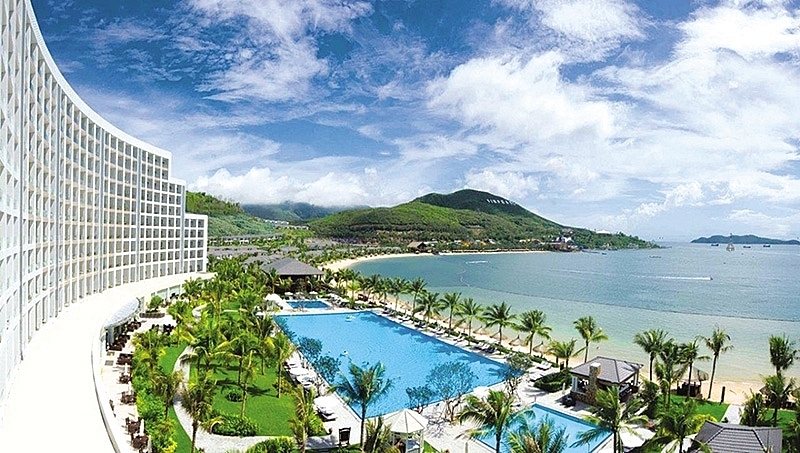 |
A huge increase in the condotel segment over the last five years has hastened the implementation of new regulations
At the discussions of the National Assembly held last week, Minister of Construction Pham Hong Ha said the standards and regulations on management and operation of condotels and officetels would be issued within 2019, to avoid any negative impacts on the new segment.
“Local authorities cannot manage thousands of condotels without a legal framework,” Ha claimed at last week’s meeting in Hanoi, adding: “We have worked with the Ministry of Natural Resources and Environment to review regulations on land use in order to consider giving ownership for this type of property, since it has not been included in any regulations so far.”
The Ministry of Construction (MoC) is now co-ordinating with the ministries of Culture, Sports and Tourism, as well as Natural Resources and Environment, along with local authorities to issue the regulations for this type of property. “This task must be done as soon as possible because there are signs of oversupply of condotels in the market recently,” Ha said.
Meanwhile, Nguyen Trong Ninh, head of the MoC’s Department of Housing Management and Real Estate Market, said as condotels have been listed in accommodation for tourism, then they must be regulated under the legal framework of the tourism sector, now under the Ministry of Culture, Sports and Tourism. Accordingly, condotel developers must be given licences by the Vietnam National Administration of Tourism.
Economist Nguyen Tri Hieu commented that the function of condotels is not yet clearly identified as for living or leasing. “If it is a product for lease, it must obey all taxation and land use regulations for business. In this case, a clear legal framework can help condotel developers take a mortgage at the bank for mobilising investment capital. If it is a housing product, it can be given a land use certificate so that owners’ rights can be protected,” Hieu said.
Meanwhile, Nguyen Tran Nam, chairman of the Vietnam Real Estate Association, emphasised that it was necessary to have a flexible plan for condotel development and investment.
“The fact is that thousands of condotels units are being constructed and any regulation would be a great impact to those, therefore the incoming regulations must be harmonised to benefit different sizes, and to benefit developers, buyers, policymakers, and local authorities,” Nam said. “The planning should be based on demand and must be designed to create demand.”
Some localities such as the central province of Binh Dinh reported that the province has experienced dramatic increases in tourism after a condotel project is developed and lessons can be learnt from this case.
Nguyen Toan Thang, director of the Ho Chi Minh City Department for Natural Resources and Environment, added that the legal framework for condotels will help developers and buyers to believe in the prospects of the condotels they have bought.
“A legal framework would facilitate the socio-economic development of any locality. Legal frameworks must be continuously updated to be suitable to the increasing demand of society,” Thang said.
According to the MoC, a condotel is a type of condominium and hotel unit not regulated in the current laws of Vietnam such as the laws on Land, Real Estate, Investment, and Housing.
The supply of condotels in the country has been strongly increasing, and now occupies 56 per cent of the total rooms for tourists, while hotel rooms occupy 44 per cent only.
Since 2014, many condotel projects have been built nationwide, especially in coastal localities such as Quang Ninh, Thanh Hoa, Danang, Quy Nhon, Nha Trang, and Phu Quoc Island. It is estimated that in 2020 there will be around 20,000 condotels units up for sale.
|
Truong Anh Tu - Lawyer Truong Anh Tu Law Firm First, the concept of a condotel must be fixed. Condotels are hotel rooms built under the design of a condominium unit and used for tourism leasing. When this concept is fixed and recognised by policymakers and developers, its legal framework then can be built accordingly. There will not be any risk for the society, and the rights of buyers will also be protected when they put their condotels into business. The problem arises when developers sell condotels to buyers to lease them into the tourism market, especially in ownership, residential management, urban planning, and the rights and obligations of the two sides in purchasing deals. In fact, this is not a purchase of an asset, but a leasing in which one side is the condotel developer and the other side is the buyer, under an agreement which has operation duration not exceeding the time in which the developer leases from the government for building the projects. Buyers need to have the right of long-term leasing or even the whole lifespan of the project, and buyers could be given that right through use of the land use right certificate because condotels are not a property for living in. Condotel buyers have the right to use their unit in vacation in a certain time only. Condotel buyers have the right to use them according to their demand during the time that they own them, however when they put it into the leasing programme the condotel must be managed and operated by the developers. At the same time, buyers taking a holiday in their units must also register with the developers under the regulations of the hotel sector. Some buyers think that they can own a condotel just like they would own a condominium unit. However, this is not true. There remain big gaps in the management, usage, and legal regulations between condotels and apartment units, mainly for the fact that condotels have not been given land use rights certificates so far. Therefore, we need to issue related regulations to manage condotels under the format of a hotel room. In this case, a certificate is not necessary to be given to a condotel. Developers and buyers who want to re-lease them can sign contracts certified with the notary offices under a contract appraised by the competent authorities. In this case, the Ministry of Culture, Sports and Tourism should be assigned to draft the format for this contract. In conclusion, regulations on condotels are for the government to control the construction, lease, re-lease, and operation of condotels like a hotel room. The difference is that special regulations should be made for thousands of rentals for holidays and re-lease during a contractible time with the developer. The duration for leasing and re-leasing must not exceed the duration of land use approved by the government for each project. VIR |
Bich Ngoc

Construction Minister says rules for condotels, officetels coming this year
Minister of Construction Pham Hong Ha said at the meeting of the National Assembly early this week that his ministry and the Ministry of Natural Resources would complete regulations relating to condotel and officetel this year.

Risks in fledgling condotel segment
Despite the lack of a legal framework and phantasmagoric profit commitments, condominium-hotels (condotels) have been one of the most attractive property products among buyers.

Vietnam is only country still developing condotels
The Vietnamese condotel market, the only one in the region, shows serious problems because of legal deadlocks.
 Condotel developers and buyers will breathe easier later in the year when the legal framework for the new type of property in Vietnam is to be released." itemprop="description" />
Condotel developers and buyers will breathe easier later in the year when the legal framework for the new type of property in Vietnam is to be released." itemprop="description" />